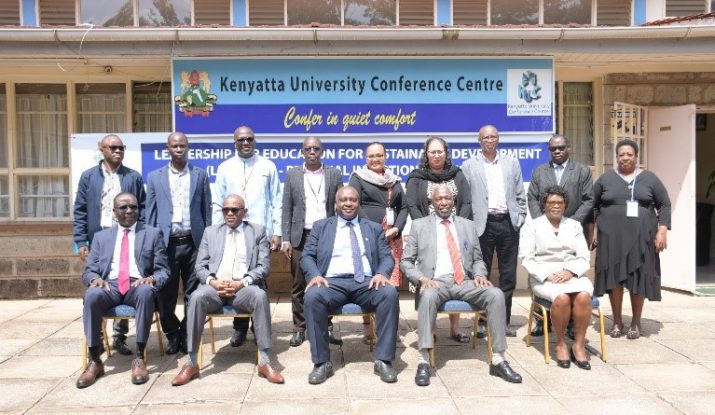The Leadership for Education for Sustainable Development (LEAD-ESD) programme was launched at Kenyatta University in a regional inception workshop held from 16th – 18th June 2025. The aim of the regional inception workshop was to enhance the understanding of the LEAD-ESD project by participants and to seek support from the ministry of education officials on the implementation of the project in the country. The LEAD-ESD programme is a 3-year (2025-2027) regional programme expected to be implemented in 13 Eastern African countries, including Tanzania, which is coming in to share experiences from the Sustainability Starts with Teachers (SST) programme implemented in the Southern Africa region. The first cohort of beneficiaries for 2025/2026 are Kenya, Uganda, Rwanda and Seychelles, while the other Eastern Africa countries will benefit in cohorts of four countries in the subsequent years.
The LEAD-ESD programme is being implemented through an Implementation Partnership Agreement (IPA) between Kenyatta University (KU) and UNESCO Regional Office for Eastern African (UNESCO ROEA) with technical and financial support provided by UNESCO ROEA and UNICEF Eastern and Southern Africa Regional Office (UNICEF ESARO). LEAD-ESD was borne out of a request from UNESCO Member States in Eastern Africa to build capacities of their teacher educators and policymakers to integrate ESD into their curricula during the biennium 2024-2025. LEAD-ESD draws from the experience and success of UNESCO-led and SIDA supported project on Sustainability Starts with Teachers (SST) implemented in 11 Southern Africa Development Community (SADC) countries between 2019 and 2022.
The LEAD-ESD project also draws from several global Initiatives around ensuring that countries are climate ready and to strengthen efforts towards the attainment of the Sustainable Development Goals by 2030 as there is a growing recognition of the central role of education in the attainment of all the 17 SDGs. It is also informed by the Greening Education Partnership (GEP), a global initiative led by UNESCO that aims to make every learner climate-ready by integrating climate education into all aspects of learning by adopting a whole-of-system approach to support countries in addressing the climate crisis through education. It is one of the outcomes of the Transforming Education Summit (TES) held in 2022, which is structured around four key pillars: – to get Greening schools, Greening curriculum, Greening teacher training and education systems’ capacities, and Greening communities. These interventions are rooted in UNESCO’s longstanding work in Education for Sustainable Development (ESD), with a particular focus on education’s role in tackling climate change, aimed at equipping individuals and communities, with the skills, values, and attitudes for shaping green, low-emission, and climate-resilient societies.
LEAD-ESD programmes is designed to support countries to achieve UNESCO ESD for 2030 roadmap and the SDG 4 Target 4.7 that strengthens the capacities of teacher educators, TVET Educators, heads of institutions, education officers and policymakers to be able to integrate sustainability principles into the curricular and education systems, build the overall national capacity to understand and implement ESD and empowers educators to address regional sustainable development concerns. It is an urgent climate change action to reverse the devastating challenges facing the earth’s ecosystems, which encourages people to make smart, responsible choices that help create a better future.

The three-day in-person LEAD-ESD inception workshop was organized by Kenyatta University with the support of UNESCO ROEA and UNICEF ESARO and brought together key technical stakeholders from the 1st cohort of the four countries, including ESD Country coordinators, ESD Focal Persons, and ESD experts drawn from academic institutions and the government. The LEAD-ESD programme was launched by the Cabinet Secretary for Education who was represented by Mr. Darius Mogaka, the Director, University Education, Ministry of Education, Kenya, who also officially opened the Regional Inception Workshop. The launch was also attended by senior officials from the Ministry of Education, Teachers Service Commission (TSC), Kenya National Commission for UNESCO (KNATCOM), UNESCO ROEA, UNICEF ESARO officials and Kenyatta University Management officials led by the Vice-Chancellor.
The aim of the regional inception workshop was to enhance the understanding of the LEAD-ESD project by participants in terms of its scope, objective, design, and implementation strategy and seek a buy-in of the project from the ministry of education officials. Through engaging sessions on policy frameworks, transformative pedagogy, action research, and institutional change projects, participants gained practical tools and strategies to lead ESD implementation in their respective contexts. Country presentations shared a collective commitment to advancing sustainability through education. It is on this commitment that the participants, including the government officials in Kenya, expressed their dedication to support and take active role in the implementation of the LEAD-ESD project in the countries. Plans are underway to launch the project and sensitize partner countries of Kenya, Rwanda, Uganda and Seychelles on its implementation through in-country virtual and physical workshops.

